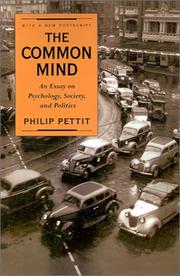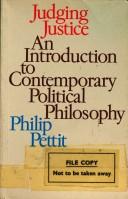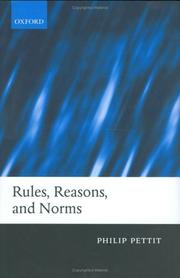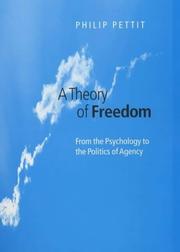| Listing 1 - 10 of 78 | << page >> |
Sort by
|
Book
ISBN: 0717107450 Year: 1975 Publisher: Dublin Gill and Macmillan
Abstract | Keywords | Export | Availability | Bookmark
 Loading...
Loading...Choose an application
- Reference Manager
- EndNote
- RefWorks (Direct export to RefWorks)
Linguistics --- Theory of knowledge --- Structuralism --- Structure (Philosophy) --- Philosophy --- Whole and parts (Philosophy) --- Form (Philosophy) --- Poststructuralism
Book
ISBN: 0520028821 Year: 1975 Publisher: Berkeley, Calif. University of California Press
Abstract | Keywords | Export | Availability | Bookmark
 Loading...
Loading...Choose an application
- Reference Manager
- EndNote
- RefWorks (Direct export to RefWorks)
Linguistics --- Ethnology. Cultural anthropology --- Theory of knowledge --- Literature --- Semiotics. --- Structural linguistics. --- Structuralism.

ISBN: 0195106458 0199872252 9786610452828 128045282X 0198026617 058534891X 9780195106459 Year: 1996 Publisher: New York (N.Y.): Oxford university press,
Abstract | Keywords | Export | Availability | Bookmark
 Loading...
Loading...Choose an application
- Reference Manager
- EndNote
- RefWorks (Direct export to RefWorks)
Intentionaliteit (Filosofie) --- Intentionality (Philosophy) --- Intentionalité (Philosophie) --- Social psychology --- Political science --- Social aspects. --- Philosophy. --- -Social psychology --- -Political science --- -Administration --- Civil government --- Commonwealth, The --- Government --- Political theory --- Political thought --- Politics --- Science, Political --- Social sciences --- State, The --- Mass psychology --- Psychology, Social --- Human ecology --- Psychology --- Social groups --- Sociology --- Act (Philosophy) --- Mind and body --- Philosophy --- Social aspects --- Intentionality (Philosophy). --- -Social aspects --- -Act (Philosophy) --- Administration --- Intentionality (Philosophy) - Social aspects. --- Social psychology - Philosophy. --- Political philosophy --- Political science - Philosophy.
Book
ISBN: 2130538665 9782130538660 Year: 2004 Publisher: Paris: PUF,
Abstract | Keywords | Export | Availability | Bookmark
 Loading...
Loading...Choose an application
- Reference Manager
- EndNote
- RefWorks (Direct export to RefWorks)
Social sciences --- Sciences sociales --- Philosophy --- Methodology --- Philosophie --- Méthodologie --- Philosophy - Social sciences --- Méthodologie
Book
ISBN: 9781107005112 1107005116 9780521182126 0521182123 9781139017428 9781139839938 1139839934 113901742X 9781139842310 1139842315 9781139844673 1139844679 1139853759 1107234190 1107254175 1283836017 1139841122 9781139853750 9781107234192 9781107254176 9781283836012 9781139841122 Year: 2012 Publisher: Cambridge : Cambridge University Press,
Abstract | Keywords | Export | Availability | Bookmark
 Loading...
Loading...Choose an application
- Reference Manager
- EndNote
- RefWorks (Direct export to RefWorks)
According to republican theory, we are free persons to the extent that we are protected and secured in the same fundamental choices, on the same public basis, as one another. But there is no public protection or security without a coercive state. Does this mean that any freedom we enjoy is a superficial good that presupposes a deeper, political form of subjection? Philip Pettit addresses this crucial question in On the People's Terms. He argues that state coercion will not involve individual subjection or domination insofar as we enjoy an equally shared form of control over those in power. This claim may seem utopian but it is supported by a realistic model of the institutions that might establish such democratic control. Beginning with a fresh articulation of republican ideas, Pettit develops a highly original account of the rationale of democracy, breathing new life into democratic theory.
Republicanism. --- Political science --- Democracy. --- State, The. --- Républicanisme --- Science politique --- Démocratie --- Etat --- Philosophy. --- Philosophie --- Republicanism --- Democracy --- State, The --- Philosophy --- Républicanisme --- Démocratie --- Administration --- Commonwealth, The --- Sovereignty --- Political philosophy --- Self-government --- Equality --- Representative government and representation --- Republics --- Social Sciences --- Political Science --- Political science - Philosophy

ISBN: 0710005636 0710005717 9780710005632 Year: 1980 Publisher: London: Routledge,
Abstract | Keywords | Export | Availability | Bookmark
 Loading...
Loading...Choose an application
- Reference Manager
- EndNote
- RefWorks (Direct export to RefWorks)
Social justice --- Justice --- Welfare economics --- 321.01 <41> --- Injustice --- Conduct of life --- Law --- Common good --- Fairness --- Equality --- Economic policy --- Economics --- Social policy --- Algemene staatsleer. Politieke filosofie. Staatsleer. Staatstheorie--Verenigd Koninkrijk van Groot-Brittannië en Noord-Ierland --- Justice. --- Social justice. --- Welfare economics. --- 321.01 <41> Algemene staatsleer. Politieke filosofie. Staatsleer. Staatstheorie--Verenigd Koninkrijk van Groot-Brittannië en Noord-Ierland

ISBN: 019925186X 0199251878 1282052721 9786612052729 0191530794 0191598224 9780199251865 Year: 2002 Publisher: Oxford: Clarendon,
Abstract | Keywords | Export | Availability | Bookmark
 Loading...
Loading...Choose an application
- Reference Manager
- EndNote
- RefWorks (Direct export to RefWorks)
Philip Pettit has drawn together here a series of interconnected essays on three subjects to which he has made notable contributions. The first part of the book deals with the rule-following character of thought. The second discusses the many factors to which choice is rationally responsive - and by reference to which choice can be explained - consistently with being under the control of thought. The third examines the implications of this multiple sensitivity for the normativeregulation of social affairs. Thus the volume covers a large swathe of territory, ranging from metaphysics to philosop
Thought and thinking. --- Rules (Philosophy) --- Decision making --- Choice (Psychology) --- Social norms --- Philosophy. --- Philosophy --- -Rules (Philosophy) --- -Thought and thinking --- Mind --- Thinking --- Thoughts --- Educational psychology --- Psychology --- Intellect --- Logic --- Perception --- Psycholinguistics --- Self --- Folkways --- Norms, Social --- Rules, Social --- Social rules --- Manners and customs --- Social control --- Deciding --- Decision (Psychology) --- Decision analysis --- Decision processes --- Making decisions --- Management --- Management decisions --- Problem solving --- Choice (Psychology). --- Rules (Philosophy). --- Thought and thinking --- Decision making - Philosophy. --- Social norms - Philosophy. --- Decision making - Philosophy --- Social norms - Philosophy

ISBN: 0745620949 0745620930 9780745620947 Year: 2001 Publisher: Cambridge: Polity press,
Abstract | Keywords | Export | Availability | Bookmark
 Loading...
Loading...Choose an application
- Reference Manager
- EndNote
- RefWorks (Direct export to RefWorks)
Liberty. --- Free will and determinism. --- Political philosophy. Social philosophy --- Free will and determinism --- Liberty --- Civil liberty --- Emancipation --- Freedom --- Liberation --- Personal liberty --- Compatibilism --- Determinism and free will --- Determinism and indeterminism --- Free agency --- Freedom and determinism --- Freedom of the will --- Indeterminism --- Liberty of the will --- Democracy --- Natural law --- Political science --- Equality --- Libertarianism --- Social control --- Determinism (Philosophy)
Book
ISBN: 9780393063974 0393063976 Year: 2014 Publisher: New York: W. W. Norton,
Abstract | Keywords | Export | Availability | Bookmark
 Loading...
Loading...Choose an application
- Reference Manager
- EndNote
- RefWorks (Direct export to RefWorks)
Liberty --- Republicanism --- Philosophy --- Liberty - Philosophy
Book
ISBN: 0585356734 Year: 1997 Publisher: Oxford : Oxford University Press,
Abstract | Keywords | Export | Availability | Bookmark
 Loading...
Loading...Choose an application
- Reference Manager
- EndNote
- RefWorks (Direct export to RefWorks)
Pettit presents a republican alternative to the liberal and communitarian theories that have dominated political philosophy in recent years, and looks at the implications of this theory for the relation between state and civil society.
| Listing 1 - 10 of 78 | << page >> |
Sort by
|

 Search
Search Feedback
Feedback About UniCat
About UniCat  Help
Help News
News